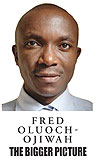This year the Congolese will celebrate their 50th anniversary since they attained independence from the Belgians. While Congo’s history as a nation state is one generally characterized by acute sadness resulting mainly from leadership, the next 50 years should present its people with a new start. The Congolese state, going by its post independence history, is in dire need of crafting new ways of conducting state business.


This year the Congolese will celebrate their 50th anniversary since they attained independence from the Belgians. While Congo’s history as a nation state is one generally characterized by acute sadness resulting mainly from leadership, the next 50 years should present its people with a new start.
The Congolese state, going by its post independence history, is in dire need of crafting new ways of conducting state business.
One radical way will be for the leadership to shift the capital from Kinshasa to a new location somewhere within the centre of the vast country.
Why do I say so? First of all, it will not be the first time it’s been done. Nigerians did it in 1976. Lagos, which was previously the capital and located in the south, lost its status as capital to a new city which Nigerians built from scratch.
Nigerians with their diverse ethnic make up and other challenges felt that Lagos was only serving the interests of the Southerners.
To strike a compromise Abuja located right in the middle of the Federal State was created. Abuja became a new capital complete with the status of a federated state in 1991.
The Congolese should seek Nigerian assistance to this kind of project. Funding such a venture would most probably not be a huge challenge to Kabila as the Chinese have already signed with DR Congo an infrastructure-for-resources swap deal.
DR Congo is in dire need of capital city capable of heeding the wishes of the different constituents who make up part of the Congolese state.
In this city the official language would most probably have to be both English and French. The new capital would essentially signify the onset a new way of conducting state business in DR Congo.
The next step should be to edge closer to the EAC for the purposes of opening up Eastern Congo for more business. I think Eastern Congo will most probably be made safer once more business starts flowing in it.
The insecurity that is resulting from rebels lurking at the Eastern fringes will, in this way, naturally take care of itself. More so if the DRC chooses to join the EAC.
Having made such a move DRC will have to empower its diverse constituents by decentralizing power to the regions. Congo’s huge size can only be beneficial to its people if power is taken closer to the masses.
This has been one of the contestations within its body politic for as long as it has been under indigenous rule.
Other issues such as security and sector reforms will fall in place once such basic governance reforms have been instituted.
Once such reforms are in place I think DR Congo will have made a complete metamorphosis. That way its people will stand to substantially benefit from its rich natural resource base. Such radical ways of conducting state business can only come from the confines of a sitting Congolese president.
If Kabila is serious about creating a new path for the Congolese I think one such way will be to make a clean break with the past. The best way is starting off by shifting the capital from Kinshasa.


